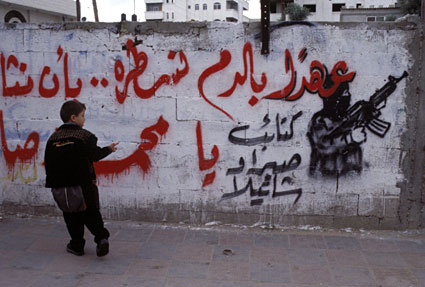
Gaza, 2002 : A young Palestinian boy mimics what he sees in the graffiti of Gaza City.
Photo: Darren Ell
|
 Gaza, 2002 : A young Palestinian boy mimics what he sees in the graffiti of Gaza City. Photo: Darren Ell |
| Salem Salama Barakeh, Deir al-Balagh, April 13:
|
|
Salem Baraka is the first man I've recorded with in Gaza. I've decided to include one or two men in each area, for purposes of comparison. I've also decided to include Palestinians of bedouin background - so often left out of national histories.
It's a social worker with the Ministry of Social Affairs, a Gazan citizen, who offers to take me to Deir al-Balagh. Here she knows several families who are dependent on aid. Though not refugees, they sought escape from unemployment in Gaza by traveling to other Arab countries to work. War rather than Oslo forced them to return to their native Gaza. One such citizen is Salem Barakeh. The large coffee pots and charcoal braziers in his courtyard are a sign of his bedouin origin. Thin, sallow-faced children hang around, silent, as we record. There's an atmosphere of poverty somehow more depressing than in a refugee camp, perhaps because in camps it is shared. There are no women present except the social worker and me. One of the men makes coffee. Salem Baraka's story is one of fortune and ultimate misfortune in the ghourba (diaspora). As a university graduate from Cairo in the early 1960s, he found employment and a good salary teaching in Kuwait. Until the Iraqi invasion of 1990 everything was fine. |
Then came displacement and disaster. He lost his job and his indemnity, his home, free schooling for his six children, his career. On top of this, with hundreds of others, he was forced to leave Kuwait during a time of war - from Kuwait to Baghdad, from Baghdad to Amman - using up precious savings, searching for, but not finding a job. Eventually they had managed to return to Gaza. Now they were 'home'. But instead of returning as a rich emigrant, Salem had returned penniless, his only mistake being a Palestinian in Kuwait in 1990.
As I had expected, Salem's narration of displacement differs greatly from those I had been hearing from women. For example, when he describes the long and dangerous drive from Kuwait, to Iraq, to Jordan, to Gaza, he never mentions being stopped at frontiers, forced to wait, the need to find food and sleeping places for children. Instead he addresses the Arab leaders, denouncing their lack of concern for those they rule over. 'Home' does not figure centrally in his narrative. Instead he complains of feeling like a prisoner in Gaza, as indeed he is.
Salem Barakeh begins his story: |
['Umm Faris'] [Mariam Abu Dakka] Copyright©2005 |
|